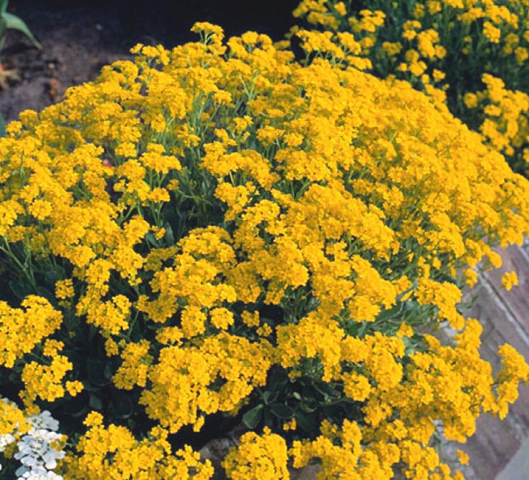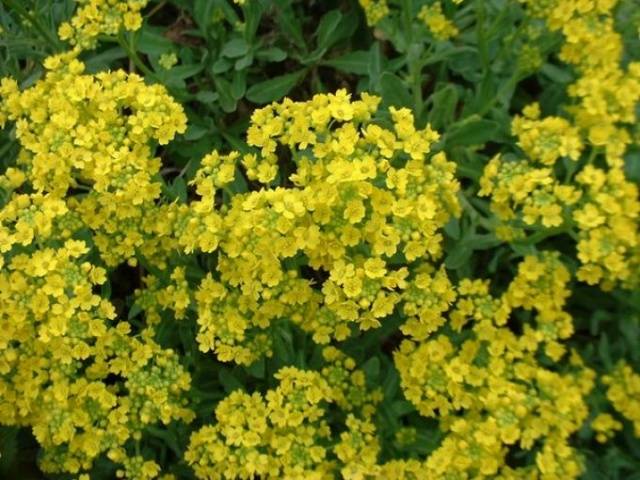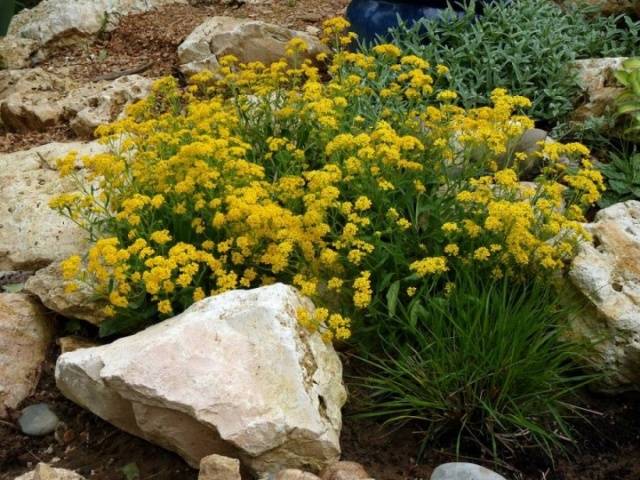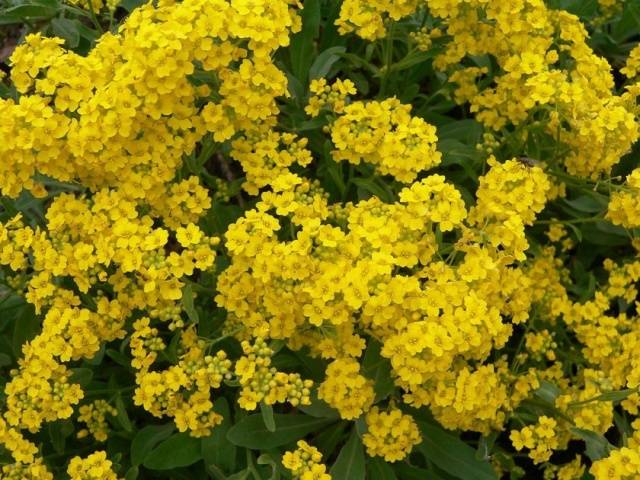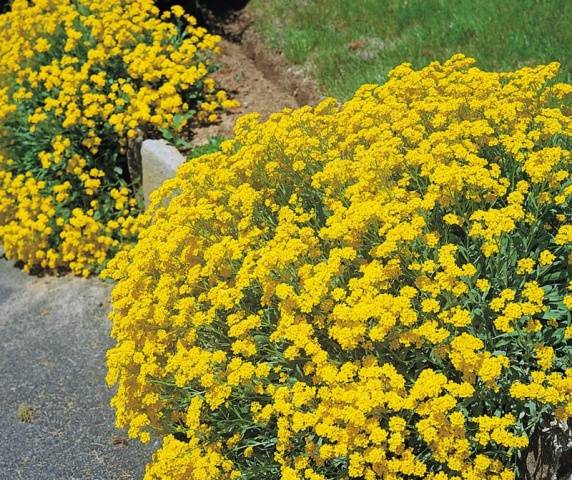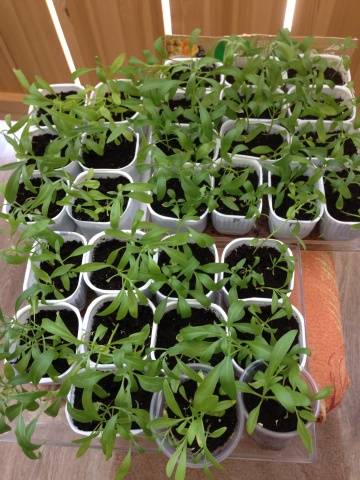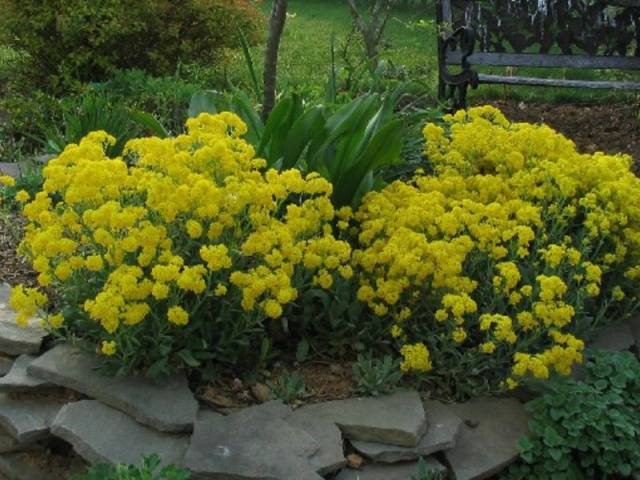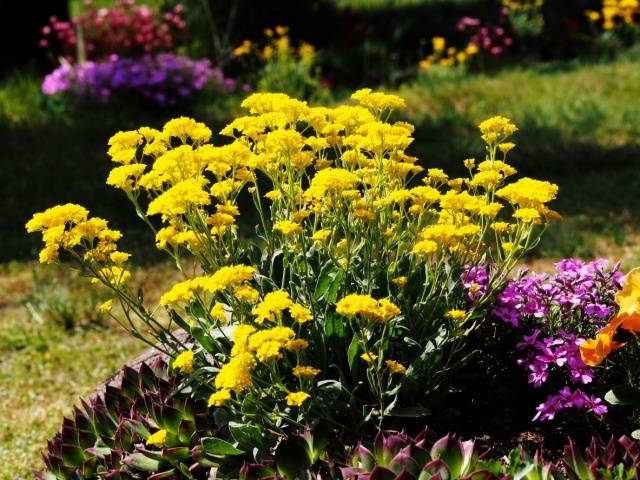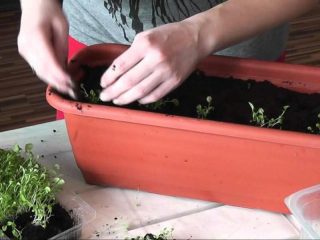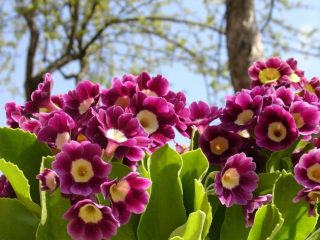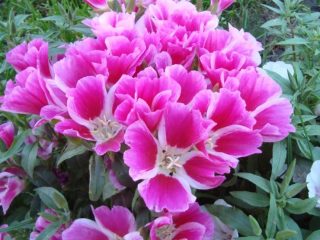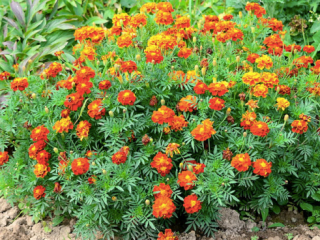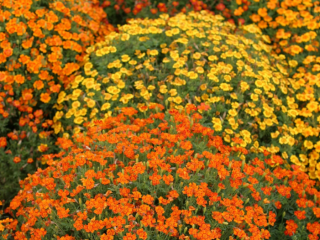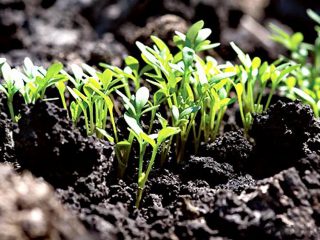Content
Rock Alyssum is a ground cover plant that attracts with abundant flowering and honey aroma. The planting and caring for rock alyssum, photos and main varieties are discussed below.
General characteristics
Rock Alyssum is a perennial plant, reaching 30 cm in height. It grows in the form of hemispherical bushes 40 cm in size. The stems are strongly branched, at the base they grow gritty.
Leaves are elongated, pubescent, gray. Flowers are small, bright yellow, bloom in inflorescences. The flowers have a strong honey aroma that attracts bees and other pollinators.
The flower consists of 4 sepals and petals, staggered. Pollination occurs with the help of insects. In autumn, the plant forms fruit in the form of pods filled with seeds.
In nature, rock alyssum is found in Europe and in southern Siberia. Flowering begins in spring and lasts for 40 days. In late summer, re-formation of inflorescences is possible.
The flower has been known since the 18th century. Its composition is not fully understood, but the seeds contain organic acids and oils. The leaves and inflorescences of the plant have a diuretic and laxative effect.
The plant is used to decorate single and multi-flowered flower beds, borders. Ideal for decorating alpine slides. The flower tolerates cold snaps down to -15 ° C, but is picky about good lighting.
Main varieties
For planting at their summer cottage, various varieties of rock alyssum are used. All varieties are resistant to adverse weather conditions and bloom profusely.
Golden wave
Alyssum of the Golden Wave variety is a highly branched perennial plant, reaching a height of 25 cm. The size of the bushes is 30-40 cm. The flowers are small, rich yellow.
The plant is propagated by seeds, cuttings and by dividing the bush. When grown from Alyssum rocky Golden Wave seeds, abundant flowering begins in May.
After planting, flowering begins in the second year. A distance of 30 cm is maintained between plants. The variety is unpretentious, grows on soils of any composition.
Gold placer
Alyssum rocky Gold placer is a brightly blooming perennial, after planting it quickly grows and covers the planting with a carpet. The plant forms many shoots.
Against the background of gray-green foliage, yellow small flowers appear, collected in inflorescences. Plant height 20 cm, flowering from early May to June. Alyssum rocky Gold placer prefers light drained soils, resistant to frost and drought.
Inca gold
Alyssum Inca Gold - ground cover perennial... Forms a dense bush up to 15 cm high. Shoots grow rapidly and cover the ground. Branched shoots, gray-green leaves.
Small yellow flowers are collected in inflorescences up to 5 cm in size. The flower has a pronounced honey aroma.
Alyssum yellow
Alyssum yellow - undersized perennial shrub, reaches a height of 10-20 cm. The shoots of the plant are ascending and recumbent, leaves are pubescent.
Inflorescences are bright yellow with a honey aroma. Prefers lighted and dry places. Necessarily requires summer pruning.
Photo of Alyssum rocky when planting and leaving:
Alyssum golden
Strongly branched perennial, forming bushes up to 25 cm high. Grows on light soils, neutral or slightly alkaline. The plant tolerates dampness, reacts positively to the introduction of organic fertilizers.
Flowering begins at the end of May and lasts 1.5 months. The flowers are small, bright yellow, collected in inflorescences. Secondary flowering is possible at the end of August until the end of September.
Landing
When propagated by seeds, alissum seedlings are first obtained, which are planted in the ground. It is allowed to plant seeds immediately in a permanent place. It is important to choose a lighted area for the flower and prepare the soil.
Seat selection
Alyssum is an unpretentious plant, however, its development and abundant flowering occurs with the right choice of a place for planting.
Primary requirements:
- constant illumination by the sun, in the southern regions - partial shade;
- fertile light soil;
- the presence of drainage.
The flower grows well on slabs and stones heated by the sun. Heavy clay soil is fertilized with coarse river sand. Be sure to add humus.
Growing from seeds
In cold regions, alissum is grown from seed in a seedling manner. For this, a light soil with a low lime content is prepared at home. The seeds of the plant are purchased in the store or harvested in the fall after flowering.
The soil is steamed in a water bath for disinfection and poured into boxes. Flower seeds are laid out on the surface and covered with a thin layer of earth. Planting is watered, covered with glass or film.
Young plants are provided with certain conditions:
- temperature from 10 to 15 ° C;
- regular ventilation of the room;
- introduction of moisture.
Alyssum seeds germinate in 1-2 weeks. When the first leaf appears in the seedlings, they are fed with complex flower fertilizer.
When 2-3 leaves appear, the seedlings are dived in separate containers. If weather conditions permit, you can do without picking and immediately move the plant into the ground.
When planting, take into account that the flower grows rapidly. Leave 40 cm between the plants. Alyssum seedlings are placed in planting holes without deepening. Sprinkle the roots with earth and water them abundantly.
When grown in a seedless way, seeds are planted in early May. The planting material is deepened by 1.5 cm and watered. When shoots appear, they need to be thinned out. For spring planting, flowering will begin later.
Growing from the seeds of the rocky Alyssum Golden Wave and other varieties is possible by planting before winter. In November, the seeds are planted in the ground, during the winter they will undergo natural stratification. After the snow melts, strong shoots will appear, and the plant will bloom in May.
Vegetative propagation
Rock Alyssum is propagated in a vegetative way. In the summer, shoots are cut, which are rooted in fertile soil. Cuttings are planted in a greenhouse or greenhouse, protected from drafts and cold snaps. When the plant is rooted, it is planted in a permanent place. Leave 30 cm between the seedlings.
Alyssum is rarely propagated by dividing the bush. For the plant to take root, you need to divide the bush before April. To do this, dig up an old bush and cut it into pieces. The resulting planting material is planted in a permanent place and watered abundantly.
Care
Alyssum is looked after by watering, loosening the soil and eliminating weeds... Top dressing helps to stimulate the formation of new shoots. The plant is pruned to maintain its decorative appearance.
Watering
Alyssum rocky needs regular watering. In a drought with a lack of moisture, the plant sheds buds and inflorescences. Abundant watering is effective if the soil has good water permeability. Stagnation of moisture provokes root rot and death of the plant.
The plant is watered with warm water settled in barrels. It is better to apply moisture in the morning or evening so that it has time to be absorbed before direct sunlight appears. Sprinkler irrigation is used for irrigation. Under the pressure of water, the roots of the plant are exposed.
After watering, the soil is loosened to improve its water permeability. Weeds that interfere with the development of the flower must be weeded. To maintain soil moisture after planting alyssum, mulching with peat or straw is performed.
Top dressing
When grown on fertile soils, alissum is fed once at the beginning of the season. Use any flower or nitrogen fertilizer. Due to nitrogen, an active build-up of the green mass of the plant occurs.
For 10 liters of water add 1 tbsp. l. urea. The resulting solution is poured over the plantings. Before flowering alissum, a complex fertilizer is applied.
Up to 4 dressings are allowed per season. An interval of 2 weeks is made between plant treatments.
Pruning
Timely pruning of alyssum ensures its continuous flowering. In the spring, remove last year's flowers, frozen and weak shoots.
In summer, after flowering, the flower is re-pruned. All shoots are shortened by 5 cm. This treatment stimulates the re-formation of inflorescences. After pruning, the plant takes on a well-groomed appearance.
Diseases and pests
The most dangerous pest for a flower is the cruciferous flea. To remove it, prepare a solution consisting of 1 tbsp. l. vinegar and 10 liters of water. Only adult bushes are processed.
Caterpillars pose a danger to the flower. Against these pests, an infusion based on pharmacy chamomile and tobacco is used. To make the solution stick better to the leaves, add a little crushed soap to it.
The disease also affects the root system. To combat the disease, fungicides Ordan, Kuproksat or copper oxychloride are used.
Alyssum is susceptible to powdery mildew, which appears as a white or grayish coating that resembles a powder. The disease spreads the mycelium of the fungus entering plant cells.
The infection covers the lower leaves of the plant and gradually spreads to the upper part of the flower. To get rid of powdery mildew, a solution of Bordeaux liquid or Topaz is prepared.
Preparing for winter
Rock alyssum does not tolerate severe cold snaps in winter. To protect it from frost in the fall, the plant is covered with dry leaves. Additionally, a pile of snow is poured onto the flower in winter. Under such a shelter, alyssum will endure the cold and keep the leaves green.
It is not recommended to prune the flower in winter. It is enough to carry out preventive shoot removal after flowering.
Conclusion
Rock Alissum is a winning option for decorating a summer cottage. The flower is unpretentious, easily propagated by seeds and cuttings. The plant is provided with minimal care, including watering and periodic feeding. Subject to the growing conditions, alyssum blooms for a long time and is not subject to diseases.
